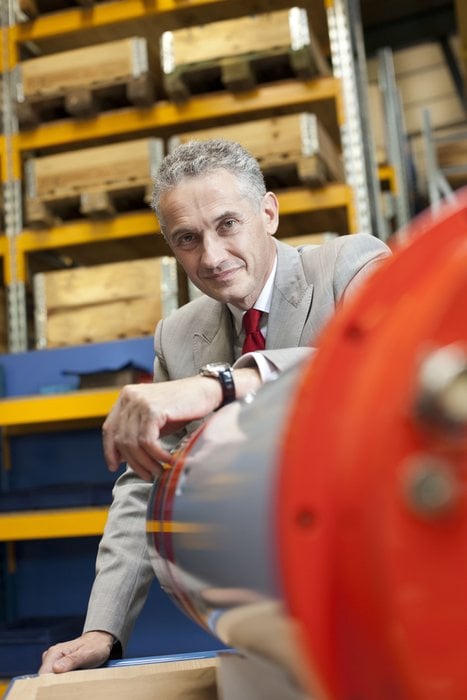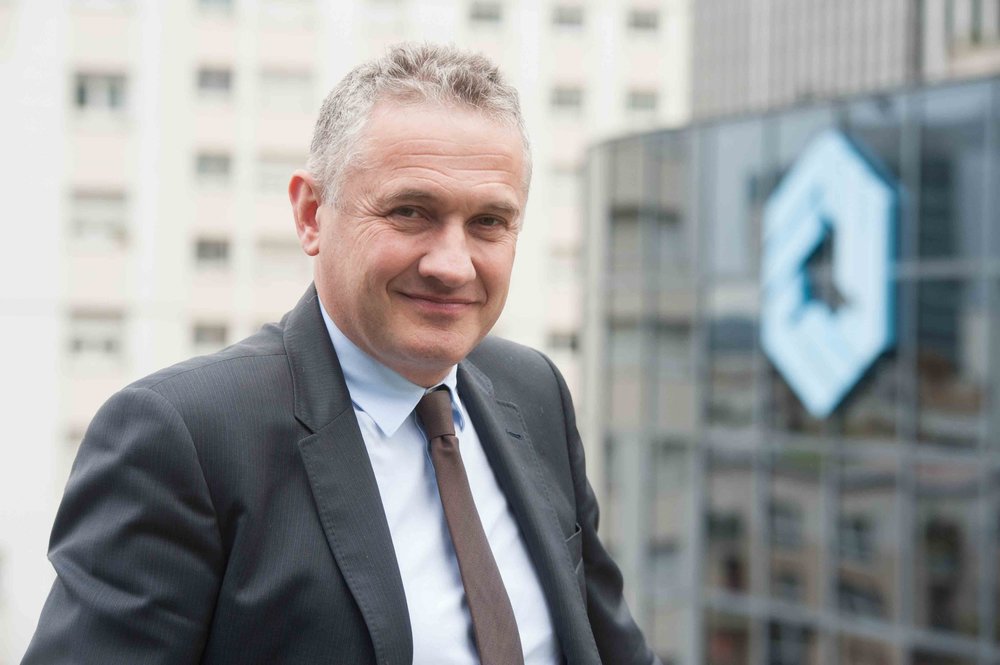www.industry-asia-pacific.com
13
'16
Written on Modified on
Stronger together: innovation, creativity, and industrial cooperation in Europe
An interview with Bruno GRANDJEAN, new President of the FIM (Federation of the Mechanics Industries - France).

Today, the main challenges in the mechanics industry are dealt with at the European level, and rely on improved European industrial cooperation. In this context, the "Industrie-du-Futur" project shall result in fruitful partnerships, based on the French industry strongest points, such as collaborative spirit, quality, creativity and innovation.
What are the key strengths of French industry?
In our country, there is a strong industrial tradition, as well as a culture of creativity and innovation. France has the largest network of high-speed trains, a first class aeronautic and aerospace industry, a highly-respected automotive industry and we are one of the few leaders in the nuclear industry. We benefit from the wide-ranging skills and passion of our highly qualified engineers, technicians and workers as well as a strong research sector. It is no accident that France has an outstanding presence in the luxury and aeronautics industries, two sectors of excellence.
The French industry has had to face the challenge of globalization and has lost some market share. How can it come back to the top?
At the heart of the Industrie-du-Futur's project is the idea that the digital revolution provides the opportunity to come back into the race. French industry must take advantage of this dynamic to get back among the top 5 of the world's industrial nations.
The rebound of investment in production and factories' modernisation is going along with the Industry-du-futur's plan; more than 3000 french companies have joined this effort of modernization with the support of our technical centres.
The development of a French additive manufacturing industry, as highlighted by the Fives-Michelin joint venture, BeAM and Prodways (Gorgé group), is a good example of a rebound of investment driven by innovation. Further examples are Dassault with the Rafale jet fighter sold around the world, Alstom, whose TGV (high speed train) has been selected to connect Boston to New York, Bolloré with its "Blue Car", an innovative concept of electric car and service, or Renault, which is launching a brand new production of the Alpine, a high-end car and a symbol of French excellence.
The network of companies involved in the mechanic industries is supplying every other industry sectors with essential technologies. It follows that the mechanic industries is at the very heart of this renewal.
Should the European Union adopt an industrial policy?
Today, Europe has become the home market for all industrial companies in the EU. It is clear that many of the challenges of globalization have to be handled at a European level, which is why policies need to be coordinated in order to optimize investments. So, France and Germany would benefit from the development of converging strategies in the energy or in the defense sectors.
It is essential that Europe shall not accept standards imposed from outside, especially in terms of safety for the digital data exchanges and for the bank transfers. We must also protect our patents, fight against dumping, and obtain a full balance for international exchanges rules. Many issues which cannot be solved apart from the European level.
How to improve European cooperation in regards to industry?
The addition of the international strengths of German and Italian industries, together with the French innovation and creativity, appears to me as a really fruitful idea.
In the mechanical industry, strong ways of cooperation already exist. Many German and Italian companies are also located in France and vice-versa. There are successful examples such as SEW Usocome, Schaëffler, or Bonfiglioli.
REDEX, the company I manage, is also located near Stuttgart and in Milan since a long period of time.
Today, very few products are from pure French, Italian or German origin; the value chains are integrated, and the final added-value is commonly created by additionnal inputs of several countries.
The FIM (French federation of Mechanics Industries), regularly exchanges with the VDMA, its counterpart German organization. At the heart of these exchanges are the Industrie 4.0 , sponsored by the German government, and the Industrie-du-Futur launched by the the french Alliance-Industrie-du-Futur
These positions are shared by political leaders, as it was shown by the summit between Angela Merkel and François Hollande at the Elysee Palace in October 2015, during a common conference on digital. It is somehow the evidence that the competitiveness of European industry is an unifying topic for our countries.

Bruno Grandjean is the CEO of REDEX, a middle size industrial French company whose products are exported to over 50 countries worldwide, and which is an European leader in "precision engineering", high-tech equipment for steel and non-ferrous industries, and for the high-tech machine tool industry.
He has been appointed as new President of the F.I.M. (Federation of Mechanical Industries - France), in June, 2016.
Graduated engineer, graduated from Stanford University, Bruno Grandjean is involved in the industry for over twenty five years. He holds several patents, and is heading the Redex Group since 2005.
What are the key strengths of French industry?
In our country, there is a strong industrial tradition, as well as a culture of creativity and innovation. France has the largest network of high-speed trains, a first class aeronautic and aerospace industry, a highly-respected automotive industry and we are one of the few leaders in the nuclear industry. We benefit from the wide-ranging skills and passion of our highly qualified engineers, technicians and workers as well as a strong research sector. It is no accident that France has an outstanding presence in the luxury and aeronautics industries, two sectors of excellence.
The French industry has had to face the challenge of globalization and has lost some market share. How can it come back to the top?
At the heart of the Industrie-du-Futur's project is the idea that the digital revolution provides the opportunity to come back into the race. French industry must take advantage of this dynamic to get back among the top 5 of the world's industrial nations.
The rebound of investment in production and factories' modernisation is going along with the Industry-du-futur's plan; more than 3000 french companies have joined this effort of modernization with the support of our technical centres.
The development of a French additive manufacturing industry, as highlighted by the Fives-Michelin joint venture, BeAM and Prodways (Gorgé group), is a good example of a rebound of investment driven by innovation. Further examples are Dassault with the Rafale jet fighter sold around the world, Alstom, whose TGV (high speed train) has been selected to connect Boston to New York, Bolloré with its "Blue Car", an innovative concept of electric car and service, or Renault, which is launching a brand new production of the Alpine, a high-end car and a symbol of French excellence.
The network of companies involved in the mechanic industries is supplying every other industry sectors with essential technologies. It follows that the mechanic industries is at the very heart of this renewal.
Should the European Union adopt an industrial policy?
Today, Europe has become the home market for all industrial companies in the EU. It is clear that many of the challenges of globalization have to be handled at a European level, which is why policies need to be coordinated in order to optimize investments. So, France and Germany would benefit from the development of converging strategies in the energy or in the defense sectors.
It is essential that Europe shall not accept standards imposed from outside, especially in terms of safety for the digital data exchanges and for the bank transfers. We must also protect our patents, fight against dumping, and obtain a full balance for international exchanges rules. Many issues which cannot be solved apart from the European level.
How to improve European cooperation in regards to industry?
The addition of the international strengths of German and Italian industries, together with the French innovation and creativity, appears to me as a really fruitful idea.
In the mechanical industry, strong ways of cooperation already exist. Many German and Italian companies are also located in France and vice-versa. There are successful examples such as SEW Usocome, Schaëffler, or Bonfiglioli.
REDEX, the company I manage, is also located near Stuttgart and in Milan since a long period of time.
Today, very few products are from pure French, Italian or German origin; the value chains are integrated, and the final added-value is commonly created by additionnal inputs of several countries.
The FIM (French federation of Mechanics Industries), regularly exchanges with the VDMA, its counterpart German organization. At the heart of these exchanges are the Industrie 4.0 , sponsored by the German government, and the Industrie-du-Futur launched by the the french Alliance-Industrie-du-Futur
These positions are shared by political leaders, as it was shown by the summit between Angela Merkel and François Hollande at the Elysee Palace in October 2015, during a common conference on digital. It is somehow the evidence that the competitiveness of European industry is an unifying topic for our countries.

Bruno Grandjean is the CEO of REDEX, a middle size industrial French company whose products are exported to over 50 countries worldwide, and which is an European leader in "precision engineering", high-tech equipment for steel and non-ferrous industries, and for the high-tech machine tool industry.
He has been appointed as new President of the F.I.M. (Federation of Mechanical Industries - France), in June, 2016.
Graduated engineer, graduated from Stanford University, Bruno Grandjean is involved in the industry for over twenty five years. He holds several patents, and is heading the Redex Group since 2005.

